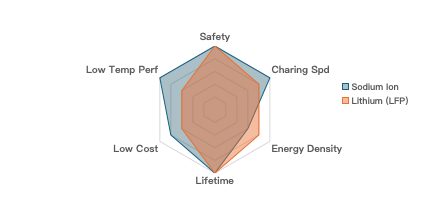Recent advancements in battery technology have positioned sodium-ion batteries as a compelling alternative to lithium-ion batteries in certain applications.
Currently, lithium-ion batteries dominate the electric vehicle (EV) market. However, for low-speed vehicles, both lithium-ion and lead-acid batteries hold significant market shares
Despite their numerous advantages over lead-acid batteries, lithium-ion batteries possess certain limitations:
Finite Lithium Resources: The limited availability of lithium resources can contribute to higher production costs.
Suboptimal Low-Temperature Performance: Performance can be significantly impacted at low temperatures, particularly during charging.
Limited Fast-Charging Capability: Rapid charging can degrade battery life and pose safety concerns.
Challenges in State-of-Charge (SOC) Estimation for LFP Batteries: The relatively flat voltage profile of Lithium Iron Phosphate (LFP) batteries can complicate accurate SOC estimation.
Sodium-ion batteries present a compelling alternative that mitigates several of the aforementioned limitations:
Abundant Resource: Sodium is significantly more abundant and readily available than lithium, offering enhanced resource security and potentially lower production costs.
Low-Cost Material: The inherent lower cost of sodium compared to lithium contributes to reduced manufacturing expenses and ultimately, more affordable battery packs.
Superior Low-Temperature Performance: Sodium-ion batteries exhibit excellent performance even in extremely cold environments, maintaining functionality down to -40°C, a crucial advantage for certain applications.
Enhanced Fast-Charging Capability: These batteries demonstrate improved charging rates compared to some lithium-ion counterparts, enabling quicker recharging times and increased utilization.
Aside from the benefits mentioned above, Sodium ion batteries also has excellent cycle life, and they are extremely safe to use. While the energy density of current sodium-ion batteries is generally lower than that of lithium-ion counterparts, this limitation is being actively addressed through ongoing research and development. Projections indicate that future generations of sodium-ion cells could achieve energy densities exceeding 160 Wh/kg, approaching the levels currently attainable by lithium iron phosphate (LFP) batteries.

At EquipPower, we recognize the significant potential of sodium-ion batteries for applications in low-speed vehicles and construction equipment. The key advantage of going with a sodium ion pack are:
Superior Low-Temperature Performance: Eliminates the need for external heating elements, reducing system complexity and cost. Enables consistent equipment operation in cold climates without compromising battery health or requiring complex thermal management systems.
Enhanced Charging Speed: Minimizes equipment downtime, a critical factor for high-utilization applications.
Excellent Cycle Life and Enhanced Safety: Ensures long-term durability and reliability, crucial for demanding construction and off-road applications.
At EquipPower, we have developed Sodium ion battery packs for low speed vehicle and construction equipment applications. We collaborate with HiNa batteries, a leading provider of advanced sodium-ion battery cells, to ensure the highest product quality and performance. We offer comprehensive engineering and manufacturing services to OEMs and ODMs, tailoring sodium-ion battery packs to meet the unique requirements of each application.